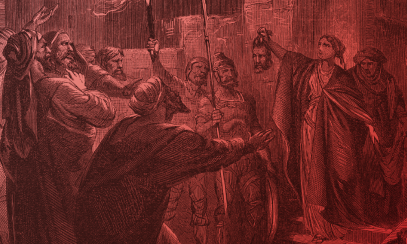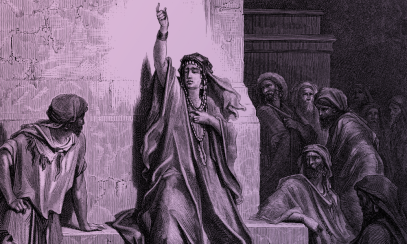
The Creed Part 3: What Do We Believe About Jesus Christ Born of the Virgin Mary?
A Nine Part Series on the Creed
A Nine Part Series on the Creed
By: Sr. Janet Schaeffler, OP, an Adrian Dominican sister, is Associate Director of the Office for Catechetics/Religious Education of the Archdiocese of Detroit
By: Sr. Janet Schaeffler, OP, an Adrian Dominican sister, is Associate Director of the Office for Catechetics/Religious Education of the Archdiocese of Detroit
This section of the Creed, which begins our beliefs about Jesus, is packed with mystery, awe and many ramifications for our lives.
Christians define the Incarnation as the union of divinity with humanity in Jesus Christ. It is the mystery of the Second Person of the Blessed Trinity becoming one of us, the mystery of Jesus Christ being God and Man.
Jesus is truly divine and truly human. He is not God disguised as a human or God wearing a human mask. Jesus is one of us, with a human soul and body like ours. The Letter to the Hebrews tells us that Jesus was like us in all things except sin. (Hebrews 4:15) He got hungry and thirsty; He grew tired. Nevertheless, in assuming a human nature, He did not stop being God.
The perfect union of humanity and divinity in Jesus raises almost endless questions. The Catechism of the Catholic Church summarizes the Church’s belief: “Jesus Christ possesses two natures, one divine and the other human, not confused, but united in the one person of God’s Son. Christ, being true God and true man, has a human intellect and will, perfectly attuned and subject to his divine intellect and divine will, which he has in common with the Father and the Holy Spirit. The Incarnation is therefore the mystery of the wonderful union of the divine and human natures in the one person of the Word.” (481-483)
The human nature of Jesus opens up a wide range of considerations about His life and the personal struggles He endured. For many people, this gives the opportunity to identify more closely with Jesus, since He was one of us and knows experientially the joys and sorrows of a human life.
In the Creed we pray, “His only Son, our Lord.” This phrase signaled to the world – accustomed to using ‘son of God’ to assert for their king a claim to divine origin – that here is a relationship more kingly and vastly different than the kings of the world. The angel’s announcement in Luke 2:10-11 calls Jesus Messiah, Lord, and Savior. The word Messiah is a Hebrew word meaning ‘anointed one.’ When it was translated into Greek by the early Church, the word became Christos or Christ. Messiah was a very important word for the Jewish people in Old Testament times. It reminded them that kings, priests and prophets were anointed with oil. “Jesus fulfilled the messianic hope of Israel in His threefold office of priest, prophet, and king.” (CCC 436)
Just like the word Lord, the word Savior was used in the Old Testament to describe God. Jesus, whose very name means ‘God saves,’ is announced to all as the Savior of the world. “Since God alone can forgive sins, it is God who, in Jesus His eternal Son made man, ‘will save His people from their sins.’” (CCC 430) “who was conceived by the Holy Spirit, born of the Virgin Mary”
“The Annunciation to Mary inaugurates ‘the fullness of time,’ the time of fulfillment of God’s promises and preparations.” (CCC 484) Here is the fulfillment given through the prophet Isaiah: “Behold, a virgin shall conceive and bear a son.” (Isaiah 7:14) “The Gospel accounts understand the virginal conception of Jesus as a divine work that surpasses all human understanding and possibility.” (CCC 497) Jesus is Mary’s only son, but her spiritual motherhood extends to all men whom indeed He came to save. (cf. John 19:26-27, Romans 8:29, Revelation 12:17)
Easter Prayer: Litany of the Holy Name of Jesus
The name of Jesus is at the heart of Christian prayer. “Jesus united Himself to all men through His Incarnation, so that “there is no other name under heaven given among men by which we must be saved.”” (CCC 432, Acts 4:12)
Ascribed to Sts. Bernardine of Siena and John Capistran, this litany was given papal attention as early as 1588 and universal recommendation by Pope Leo XIII in 1886.
|
Lord, have mercy. Christ, have mercy. Lord, have mercy . Response: Have mercy on us. God the Father of heaven, God the Son, Redeemer of the world, God the Holy Spirit, Holy Trinity, one God, Jesus, Son of the living God, Jesus, splendor of the Father, Jesus, brightness of everlasting light, Jesus, king of glory, Jesus, dawn of justice, Jesus, Son of the Virgin Mary, Jesus, worthy of our love, Jesus, worthy of our wonder, Jesus, mighty God, Jesus, father of the world to come, Jesus, prince of peace, Jesus, all-powerful, Jesus, pattern of patience, Jesus, model of obedience, Jesus, gentle and humble of heart, Jesus, lover of chastity, Jesus, lover of us all, Jesus, God of peace, Jesus, author of life, Jesus, model of goodness, Jesus, seeker for souls, Jesus, our God, Jesus, our refuge, Jesus, father of the poor, Jesus, treasure of the faithful, Jesus, Good Shepherd, Jesus, the true Light, Jesus, eternal Wisdom, Jesus, infinite Goodness, |
Jesus, our Way and our Life, Jesus, joy of angels, Jesus, king of patriarchs, Jesus, teacher of apostles, Jesus, master of evangelists, Jesus, courage of martyrs, Jesus, light of confessors, Jesus, purity of virgins, Jesus, crown of all saints, Response: Jesus, save Your people Lord, be merciful, From all evil, From every sin, From the snares of the devil, From Your anger, From the spirit of infidelity, From everlasting death, From the neglect of Your Holy Spirit, By the mystery of Your Incarnation, By Your birth, By Your childhood, By Your hidden life, By Your public ministry, By Your agony and crucifixion, By Your abandonment, By Your grief and sorrow, By Your death and burial, By Your rising to new life, By Your return in glory to the Father, By Your gift of the Holy Eucharist, By Your joy and glory, Christ, hear us. Christ hear us. Lord Jesus, hear our prayer . Lord Jesus, hear our prayer. Lamb of God, Who takes away the sins of the world, have mercy on us (x3) Let us pray: Lord, may we who honor the holy name of Jesus enjoy His friendship in this life and be filled with eternal joy in the kingdom where He lives and reigns for ever and ever. Amen.
|
If Christ is both human and divine, how can He be one person not two?
In the early Church the following question arose: After the Incarnation was Jesus two persons – a divine person and a human person – or was he one person, and if so, which one? The followers of Nestorius, the bishop of Constantinople, mistakenly thought that Jesus was a human person in whom God was housed. This implied that Jesus was two persons: a divine person inside a human person – like putting flowers in a vase.
To set things straight Nestorius himself asked that a Church council answer the question. The Council of Ephesus was called in A.D. 431. That council, as well as the Council of Chalcedon in A.D. 451, condemned any teaching that would split Christ into two persons. The Church clearly teaches that Jesus is one Person: a divine Person with two natures – a divine nature and a human nature. At the Incarnation the Second Person of the Trinity took on a human nature, not another person.
For this reason the Council of Ephesus proclaimed that “Mary truly became the Mother of God (Theotokos) by the human conception of the Son of God in her womb.” (CCC 466)
Reflection: 7 feelings Jesus had
God revealed divine love to us in the person of Jesus Christ, the Word made flesh. Jesus shared all our human characteristics and feelings. In the Gospels we find a description of the human experiences of Jesus.
Select from the list below a story that describes a feeling or human characteristic of Jesus. Reflect on the meaning of this story. You may wish to record your insights in a prayer journal.
1 Jesus was compassionate: Matthew 9:36
2 Jesus was angry: Matthew 21:12-13, Mark 3:5
3 Jesus was troubled: John 11:33
4 Jesus was tempted: Matthew 4: 1-11
5 Jesus was crying: John 11: 35-36
6 Jesus was loving: Mark 10:21
7 Jesus was emotionally upset: Mark 14:32-42
With what human feelings of Jesus do you identify? How did Jesus handle these feelings?



